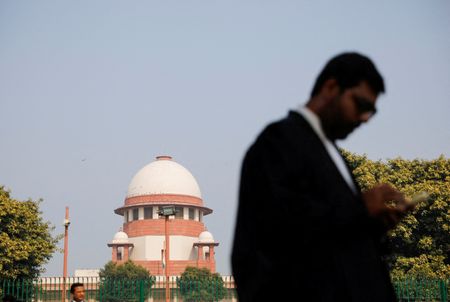MUMBAI (Reuters) -The Indian rupee, equities and bonds dropped on Thursday, pressured by risk aversion after India said it pushed back Pakistani retaliation overnight.
The rupee dropped 1% to 85.71, the Nifty 50 benchmark share index declined 0.6%, while the yield on India’s benchmark 10-year bond rose 6 basis points.
The markets came under pressure in late afternoon trading after the Indian government said it had “neutralised” attempts by Pakistan to “engage” several military targets. Pakistan, meanwhile, said it had shot down 25 drones from India in its airspace.
“This is a knee-jerk reaction from the markets just as we had expected due to the escalation of border tensions,” said Sandeep Bagla, CEO of Trust Mutual Fund.
On Wednesday, India said it hit “terrorist infrastructure” in Pakistan two weeks after it accused the Islamic nation of involvement in an attack in Indian Kashmir in which 26 people, mostly Hindu tourists, were killed.
The United States, Russia and China have urged the South Asian countries to exercise restraint.
Volatility gauges for the rupee and Indian equities have spiked, reflecting the nervousness among market participants.
The Nifty volatility index rose to a peak of 21.9 in intra-day trade, the highest since April 9, while the rupee’s volatility has also spiked to an over two-year high.
India’s overnight index swap (OIS) rates also jumped, with the most-liquid five-year rate rising 12 basis points to 5.68% on the likely unwinding of speculative positions
In Pakistan, trading in the benchmark share index was halted after the index slumped 6.3% on news of the drone attacks. The country’s international bonds also extended recent losses.
Cross-border developments are expected to stay in focus going forward, with market participants likely to remain risk-averse in the near term, traders said.
“If the conflict were to escalate, worries might rise regarding important industrial / infra facilities located close to the India-Pakistan border,” Jefferies said in a report dated May 7.
“Based on precedents, we believe that any potential market correction on the back of escalation would be short-lived.”
In the medium term, traders expect the focus to return to fundamentals and the U.S.-India talks on a trade deal, following the UK-India trade deal.
(Reporting by Jaspreet Kalra, Khushi Malhotra and Bharath Rajeswaran; Editing by Mrigank Dhaniwala)







